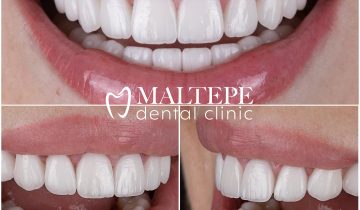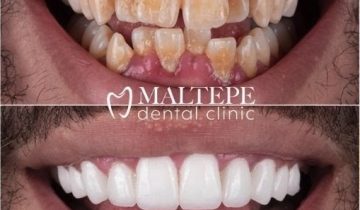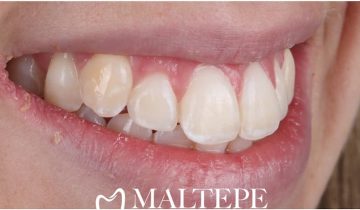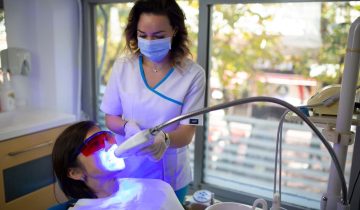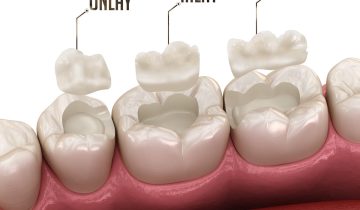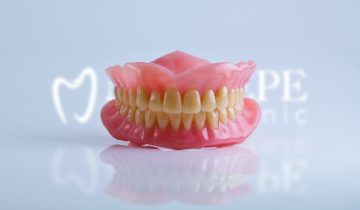Last updated on October 18th, 2023
A partial denture is a practical dental appliance to replace multiple teeth. They are removable, and they offer instant solutions when needed. Unlike full dentures, partial dentures don’t cover the whole upper or lower arch of the mouth.
Patients who are missing several teeth might have problems with biting, chewing, and speaking. Since they still have some healthy teeth left in their mouth, getting full dentures or other invasive treatments might be unnecessary. If this is the case for you, then partial dentures might be the way to go.
In this post, you will learn more about partial dentures. If you are suffering from missing teeth, and are already thinking about partial dentures, you will find some very important information about this treatment in this article that can help you make up your mind.
What Are Partial Dentures?
A partial denture is a removable dental appliance used to enhance the function and appearance of teeth by replacing missing teeth in the upper or lower arch. Patients simply wear them to eat and speak comfortably throughout the day. At the end of the day, the dentures need to be taken out and cleaned.
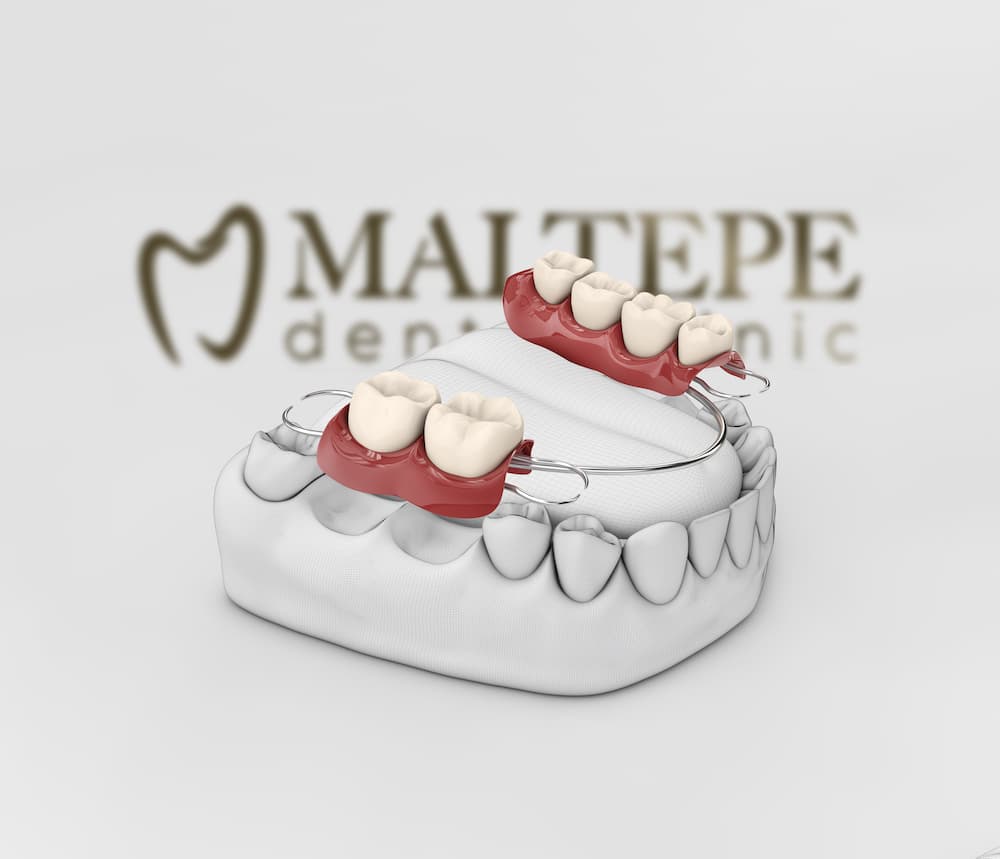
Dentures mimic the natural tooth color and shape so that patients can have beautiful smiles in a functional and non-invasive way. Most dentures are made from acrylic resin, but there are also porcelain partial dentures available, too. Some acrylic-based dentures are supported by a metal frame (cast metal) to increase durability.
Types of Partial Dentures
Partial dentures are made for various purposes, and thus there are different types of partial dentures with respect to their shape, material type, …etc. Here are a few brief explanations of the different types of dentures.
Location In The Mouth
Partial dentures are used for replacing front or back teeth. The ones used for front teeth are called anterior partial dentures, and dentures used for back teeth are called posterior partial dentures.
Materials Used In The Manufacturing
As for materials, you can find partial dentures made with plastic polymers or metal bases. Metal-based dentures are more durable, but plastic ones are aesthetically more pleasing since no metal is exposed in the mouth. Additionally, there are flexible dentures made from lightweight thermoplastics. They are very lightweight, but they tend to look bulky.
Attachment Techniques
There are two typical attachment techniques to fit a partial denture. They use either clasps or precision attachments. A clasp is a small metal appliance encircling the adjacent tooth, partially or completely, to keep the denture stable. They may be visible depending on the location of the partial denture.
Dentists can also utilize precision attachments to fit partial dentures in a patient’s mouth. Those attachments can be studs, bars, or magnets. They are invisible, and thus, these partial dentures look much better aesthetically.
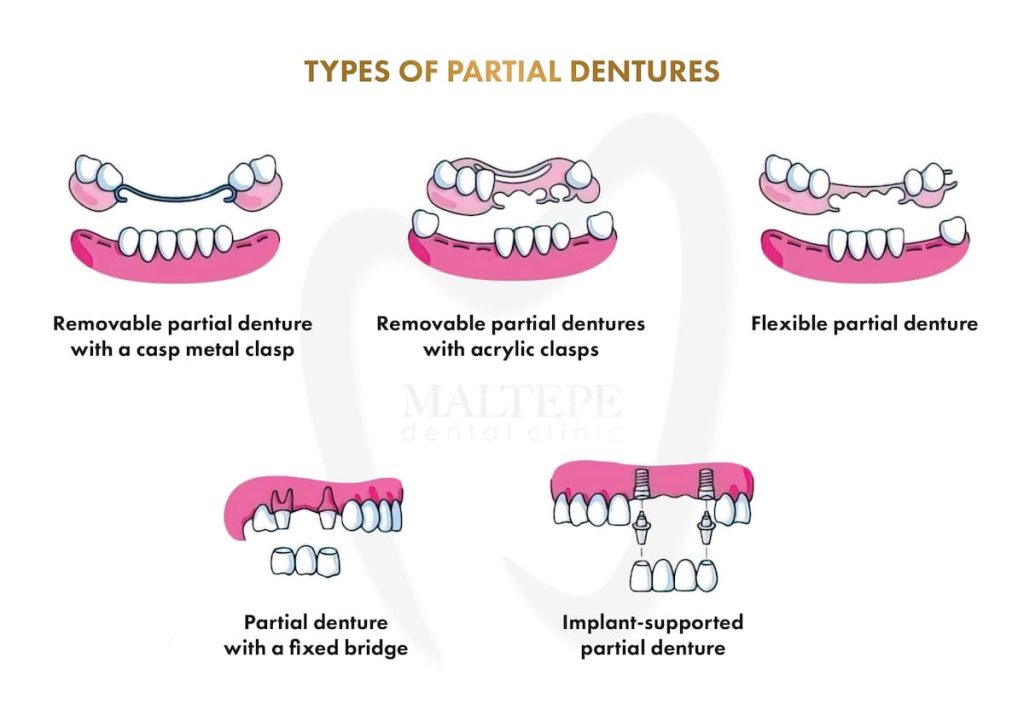
How Do Partial Dentures Work?
Getting partial dentures might require a series of appointments with your dentist. The dentist examines the area that the partial denture is going to replace. If there are tooth remnants, your dentist will need to remove them. Then, the partial denture is prepared by making use of dental impressions and a wax rim to provide the correct bite. Finally, you will have your partial denture installed when it is ready. Your dentist will do the final adjustments for you at that time.
Partial dentures are attached to a plastic or metal framework, which replaces the missing teeth. They function just like natural teeth. They are similar to bridges in terms of function, but partial dentures fill much larger spaces. Thanks to the strong grip and seamless look they provide, the whole mouth looks better overall when you smile.
Benefits of Partial Dentures
According to an article on WebMD, partial dentures provide patients with the following benefits:
- They fill a significant space when missing multiple teeth.
- They prevent the remaining healthy teeth from losing their ideal position and shape.
- Since precision partial dentures are removable, patients can always detach them if they change their minds.
- They are more affordable compared to other surgical treatments such as dental implants.
- They offer natural-looking teeth for a better smile.
Caring for Your Partial Dentures
Proper care and maintenance are extremely important for your dental health and for the durability of your partial dentures.
Cleaning the dentures is key to ensuring the longevity of your dental appliance. A partial denture is removable, which makes it easier for you to clean every day. Use a soft toothbrush, but avoid toothpaste when cleaning. Toothpaste is best suited for natural teeth, and not with the materials used to make dentures. Toothpaste tends to be too abrasive for dentures. Alternatively, you can use mild soap or over-the-counter cleaning tablets made especially for dentures to ensure better hygiene.
Also, avoid dropping them on hard surfaces since partial dentures can be broken or lose their alignment easily.
Tips for Wearing Partial Dentures Comfortably.
If you stick to the following routines, you are more likely to use a partial denture more comfortably:
- Use a denture adhesive.
- Handle the dentures carefully.
- Take out your dentures before you sleep.
- Clean and rinse your dentures frequently.
- Avoid food or drinks that may be abrasive to dentures.
- If you are still having issues with comfort even after the adjustment period, see your dentist.
Adjusting to Your Partial Dentures
Getting used to a partial denture can take some time since they are the replacement for missing natural teeth that you once had. However, it can still be uncomfortable for many patients initially.
Chewing food is one of the most common problems. You can ease the adjustment period by chewing on both sides as evenly as possible. Also, avoiding hard or sticky foods will help your dentures feel more comfortable and stop them from moving.
Speaking can be another challenge that patients might face. Pronunciation of certain sounds may be difficult, too. However, most patients speak better and better as they get used to partial dentures. Practice reading aloud, repeating certain words and sounds might help you get through the adjustment period faster.
Fortunately, the initial problems, when adjusting to the dentures, will disappear after a short time. However, it is still beneficial to know about the types of discomfort. If you think your mouth is not adapting to your partial denture, you should see your dentist to refit your dentures.
How Much Do Partial Dentures Cost?
The average price of a partial denture should be somewhere around $1,500. However, the exact price will vary depending on the number of teeth replaced, the material used, your payment/insurance plan, manufacturing techniques, the location where you receive the treatment, and any other treatments you had at that time.
You can discuss the price and other payment details with the clinic you choose. Most dental clinics offer a free quote even before you apply to them in person. You can start this process on the Internet or by phone.
Frequently Asked Questions About Partial Dentures
Here are some of the most frequently asked questions that people have about partial dentures.
Will Partial Dentures Affect My Ability To Speak Or Eat?
Dentures might affect chewing, biting, or speaking until you get used to it, but fortunately, it doesn’t take long for that to happen.
How Long Do Partial Dentures Last?
They can last up to 15 years depending on how well you care for them.
How Can I Make My Partial Dentures Last Longer?
You can use a partial denture for longer if you take good care of it.
How Often Do I Need To Clean My Partial Dentures?
You should clean it daily.
How Should I Store My Partial Dentures When I’m Not Wearing Them?
Put it in a denture-cleaning solution in a closed container so that kids and pets cannot reach it.
Can I Sleep With My Partial Dentures In?
It is not a good idea. Sleeping with dentures in your mouth can lead to gum inflammation and bacterial build-up.
How Much Do Partial Dentures Cost?
On average, it costs around $1,500.
Can Partial Dentures Be Repaired If They Break?
If the damage is only minor, dental technicians or dentists can repair a partial denture.
What Should I Do If My Partial Dentures Feel Uncomfortable?
If you think the adjustment period has been prolonged, you should visit your dentist to get it relined or fitted.
How Often Should I See My Dentist For Check-Ups With My Partial Dentures?
It is recommended that partial dentures be fitted and maintained every six months.

